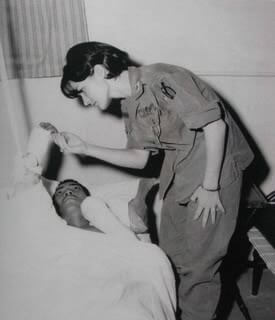
 A Minnesota PBS Initiative
A Minnesota PBS Initiative
"Andrews! What are you doing dressed like that?"
PFC Andrews, one of my corpsmen, just walked onto Ward 1 at the 93rd Evac Hospital. Skinny, bespectacled, cocky teenager, he wears his full battle uniform, including his M-16.
"I'm gonna be guarding you, tonight, Ma'am."
I'm stunned. It's the first time I realize my corpsmen have duty besides patient care. Andrews bounces through the length of the ward to exit out the west door. He will be in the guard tower on the perimeter fence, tonight, just past the ditch beyond the door.
Yesterday, I learned something else new. Alone, or so I thought, with my patients on the 72-bed, X-shaped ward, I discovered Specialist Kelly at work in a far corner.
"Kelly, didn't you hear? You're supposed to report for weapons inspection."
"Yes, Ma'am. But, I don't need to report."
"Oh, but you do. They said all corpsmen have to...."
"No, Ma'am. I'm a C.O. I'm not required to report. I don't have a weapon."
Again, I am stunned. My esteem for this combat medic soars even higher. He hasn't shirked hazardous duty with his conscientious-objector status. My Haight-Ashbury flower-child-artist corpsman has to be braver than many. Like doctors, nurses and other healthcare personnel carrying the Geneva Convention card as noncombatants, Kelly is here, unarmed. He is doing his duty while still honoring his convictions. I am impressed.
This is nursing in a combat zone. This is Long Binh Post, Republic of Viet Nam, 1968.

Edy in Vietnam, checking patient's circulation. Unknown photographer.
I rather like the 12-hour night shift. The Armed Forces channel on the television sets that sit on a high shelf at the far corner of each wing has signed off with the National Anthem. Time for lights out along the four aisles radiating out from the nurses' station at the center. The ward is quiet, except for the low rumble of B-52s out somewhere on the horizon, targeting enemy maneuvers.
Even though the temperature is above mid-seventies, I shiver in my field jacket. It's at least 30 degrees cooler than daytime, and I guess my blood is too thin to keep me warm in the night.
We don't have air-conditioning here, unless you count cross-draft from the four entrances and the windows. At night we shut the doors, of course.
Time for my rounds down the eight, long rows of old metal hospital beds, army cots, and even bunk beds at the far end of each wing. Closest to the nurses' station sit the beds with the severest casualties that need most attention. All the IV drips are on time, according to the strip of white tape, marked off by the hour to assure just the right amount of medicated fluid is given.
I double-check the rate, counting the drops per minute splashing in the drip-chamber. I check body casts and dressings for bleeding, outlining with a marking pen where the stain has increased beyond earlier such marks. Some dressings need reinforcement and fresh ice packs to halt bleeding into field-contaminated wounds left open for drainage to avoid infection.
Stateside, I would shine my flashlight against my white uniform to view my patient in the reflected light, as I check their breathing. Here, wearing my green jungle fatigues, the light is too muted. So, I shine the light onto the sheet or pillowcase.
Here I stand, responsible for all these defenders of freedom, while they sleep in blissful peace, trusting a solitary nurse for their safety. It's almost as if I am their guardian angel.
My brave, strong, soldiers, medicated for pain in some cases, sleep like so many little brothers.
Rounds finished, the last walking-wounded soldier (sitting at the desk to tell me his stories) gone to bed, I tell my two corpsmen to grab an empty bunk at the end of a ward and get some sleep.
I appreciate, now, how much they need it, since they do double-duty. I can always wake them for help, if necessary.
Before turning to the charts waiting at the desk, I survey my sphere of responsibility bathed in the light of a single florescent lamp at the nurses' station. I shoot up a prayer for safety for PFC Andrews, watching over us from the guard tower.
Suddenly, a thought strikes me, stinging my eyes with tears. Here I stand, responsible for all these defenders of freedom, while they sleep in blissful peace, trusting a solitary nurse for their safety. It's almost as if I am their guardian angel. And they can sleep because I am here.
As I pick up my pen, I thank the Lord I can trust Him to surround us all with His holy angels.
Several other oral histories on MN women in Vietnam on the MNHS site.
Story Themes: 1967, 1968, 1969, 1970, 1971, 1972, 1973, 1974, 1975, 93rd Evacuation Hospital, Army, BIen Hoa, Career Military, Conscientious Objection, Edy Johnson, Long Binh Post, Medical Personnel, Minneapolis, Physical Wounds, Reflection, Relationships, Religion